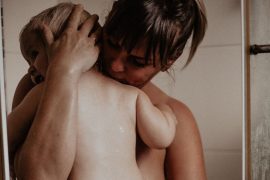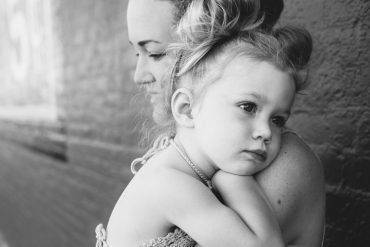Three key factors to mindful parenting
- Notice your own feelings when you’re in conflict with your child
Think about your most recent argument or a frustrating situation with your child. What feelings are triggered? Are you angry, ashamed, embarrassed? Try to experience your emotion or trigger as a wave coming and going. Try not to block or stop the emotion. Don’t push it away. Don’t judge or reject it. Don’t try to keep the emotion around. Don’t cling to it. Don’t make it bigger than it already is. You are not your emotion and you don’t have to act on the emotion. Just be there, fully mindful of it. Remind yourself that you don’t need to blame yourself or your child for what happened.
Next, try to see the conflict through your child’s eyes. If you can’t see goodness in your child during a tantrum or argument think of a time when you felt connected with your child and responded with kindness. Try to remember that version of your child when you are triggered.
As you go throughout your day make an effort to notice when you start to feel anxious or annoyed. That may be a signal that you are being triggered. Once you figure out your triggers, you can move to the next step.
- Learn to pause before responding in anger
The most challenging and most important part of mindfulness is being able to find that calm space in the heat of the moment. We practice finding the space this by focusing our attention on our body and breath because emotions show themselves as changes in body or breath. When we slow down and focus on our body and breath, there is a physiological change that decreases our reflexive responses and increases the abilities of our prefrontal cortex.
All of this leads to a calmer mind where you can find the space to sit with the emotion. When we are able to pause we can experience the emotions as sensations in our body without fueling them by focusing on the trigger. In that space we can remind ourselves to breathe and bring our thoughts back to the present moment and then choose to respond how we want to and not react because we are out of control.
- Listen carefully to a child’s viewpoint even when disagreeing with it
Your child is going to act like a child! This means they won’t always be able to manage their feelings. Kids are still learning how to regulate (actually, so are most adults) and have different priorities than you do. Their behavior will push your button at times, and that is okay.
The problem is when adults begin acting like kids, too. If, instead, we can stay mindful – meaning we notice our emotions and let them pass without acting on them – we model emotional regulation, and our children learn from watching us.
Learning to pause before responding takes practice and our ability to control our emotions change depending on what’s going on each day. That is why self-care is so important. We can’t pour out all of ourselves every day and never take the time to fill back up. Many parents feel guilty for taking care of their own needs. That is not selfish – it’s necessary. Make yourself a priority, because the better you feel, the better you will be able to manage the frustrations that arise.
It is important to learn how to help yourself and how to meet your emotional needs. Examples of self-care can range from things like taking a time-out by hiding in the bathroom when you can’t handle your kids (which I did last night), taking a few minutes of deep breathing, putting the television so you and your kid get a break, writing in a journal, taking a shower, going for a walk, or talking to your partner or a friend.
And, sometimes we can’t catch ourselves in time and we do react in ways we regret. In those moments, we can apologize to our kids after we yell at them because we are still learning and parents make mistakes too.
Jill Ceder is psychotherapist, writer and mom of two. She spends her days working with women, adolescents, children and families. She especially loves working with parents, coaching them on how to find patience and humor in raising children. She also writes the Child Care section for VeryWell.com and is a 30 Second Mom Contributor. Her writing has been featured in various parenting publications including Scary Mommy, The Good Men Project and Parent.co. When she is not working, she spends her time chasing her two kids around Brooklyn. You can read more of her writing on her website www.jillceder.com.










